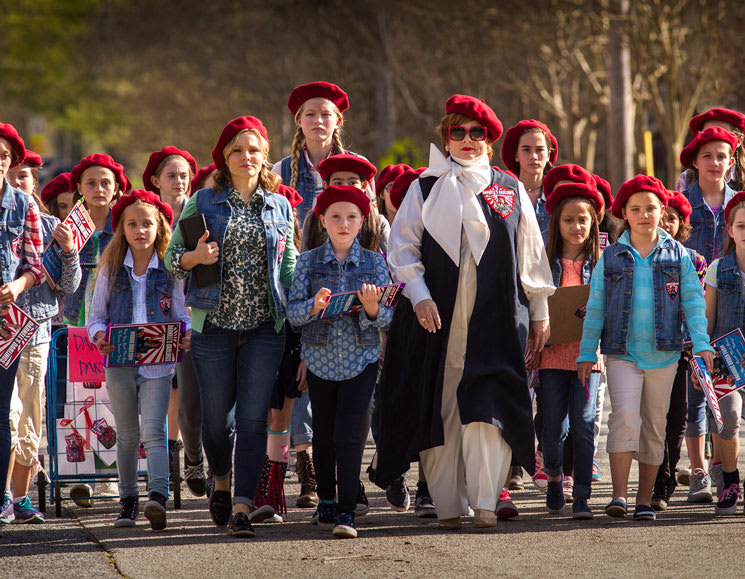Melissa McCarthy is an irrepressible comic force of nature easily capable of devouring scenes, chewing them up and spitting them back out. In The Boss, she curses a blue streak, engages in hand-to-hand combat with young girls and pratfalls like the second coming of Chris Farley she once portrayed on Saturday Night Live. But unfortunately for the rest of the movie, there's little else for anyone to do but get out of the way and let her run roughshod over everything in her path.
McCarthy portrays Michelle Darnell, a highly successful and ruthlessly ambitious businesswoman who's come a long way since she was routinely abandoned by foster families back in her childhood. Michelle now presides over well-attended seminars featuring pyrotechnics and T-Pain to help others achieve the same prosperity, but rewards her long-suffering assistant Claire (Kristen Bell) with inadequate pay and little respect.
When former flame-turned-rival Renault (Peter Dinklage) reports her for insider trading, however, Michelle is forced to serve a short prison sentence, and finds her old life is no longer there waiting for her upon release. So, she shacks up with a reluctant Claire and her young daughter Rachel (Ella Anderson), until a visit to Rachel's Dandelion Girls meeting and a bite of Claire's delicious homemade brownies gives Michelle an idea for a business venture that just might get her back on the road to wealth.
Reuniting McCarthy with Tammy director and real-life husband Ben Falcone, The Boss has an anarchic streak that serves both McCarthy and the comedy well. The film really takes off when Michelle first walks into the Dandelion Girls meeting, wrests control away from the group's leader (an always welcome Kristen Schaal) and begins to teach the girls all about capitalism in her own uncouth way. An uproarious set piece in which Michelle's brownie-selling girls violently clash with cluster-selling rivals gleefully pisses on any bastions of good taste.
But the plot eventually veers down all-too-familiar and predictable paths regarding Michelle's inability to accept being part of any family, and though McCarthy is especially affecting in one pivotal emotional scene, the film still begins to feel bogged down by sentimentality. Bell fares well enough with the thankless task of playing foil to all of McCarthy's antics, but Dinklage's villain, and especially an extended climax in which Michelle and Claire are forced to surreptitiously break into his office feel as if they belong in an entirely different movie.
Thus far, McCarthy's biggest comedic hits — Bridesmaids, The Heat and Spy — have all come when working with director Paul Feig, which bodes well for her upcoming turn in the Ghostbusters remake. But while her collaborations with Falcone — she co-wrote the screenplay here with him, as with Tammy — have left a little something to be desired, they've also showcased McCarthy at her most vulgar, unfiltered and, too occasionally, even at her funniest.
(Universal)McCarthy portrays Michelle Darnell, a highly successful and ruthlessly ambitious businesswoman who's come a long way since she was routinely abandoned by foster families back in her childhood. Michelle now presides over well-attended seminars featuring pyrotechnics and T-Pain to help others achieve the same prosperity, but rewards her long-suffering assistant Claire (Kristen Bell) with inadequate pay and little respect.
When former flame-turned-rival Renault (Peter Dinklage) reports her for insider trading, however, Michelle is forced to serve a short prison sentence, and finds her old life is no longer there waiting for her upon release. So, she shacks up with a reluctant Claire and her young daughter Rachel (Ella Anderson), until a visit to Rachel's Dandelion Girls meeting and a bite of Claire's delicious homemade brownies gives Michelle an idea for a business venture that just might get her back on the road to wealth.
Reuniting McCarthy with Tammy director and real-life husband Ben Falcone, The Boss has an anarchic streak that serves both McCarthy and the comedy well. The film really takes off when Michelle first walks into the Dandelion Girls meeting, wrests control away from the group's leader (an always welcome Kristen Schaal) and begins to teach the girls all about capitalism in her own uncouth way. An uproarious set piece in which Michelle's brownie-selling girls violently clash with cluster-selling rivals gleefully pisses on any bastions of good taste.
But the plot eventually veers down all-too-familiar and predictable paths regarding Michelle's inability to accept being part of any family, and though McCarthy is especially affecting in one pivotal emotional scene, the film still begins to feel bogged down by sentimentality. Bell fares well enough with the thankless task of playing foil to all of McCarthy's antics, but Dinklage's villain, and especially an extended climax in which Michelle and Claire are forced to surreptitiously break into his office feel as if they belong in an entirely different movie.
Thus far, McCarthy's biggest comedic hits — Bridesmaids, The Heat and Spy — have all come when working with director Paul Feig, which bodes well for her upcoming turn in the Ghostbusters remake. But while her collaborations with Falcone — she co-wrote the screenplay here with him, as with Tammy — have left a little something to be desired, they've also showcased McCarthy at her most vulgar, unfiltered and, too occasionally, even at her funniest.
